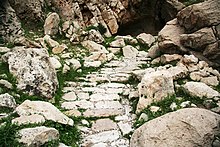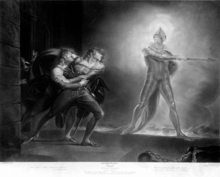Undead
Appearance

To kill Gilgamesh and his city.
For if you do not grant me the Bull of Heaven,
I will pull down the Gates of Hell itself,
Crush the doorposts and flatten the door,
And I will let the dead leave
And let the dead roam the earth
And they shall eat the living.
The dead will overwhelm all the living! ~ Inanna
The undead are beings in mythology, legend, or fiction that are deceased but behave as if they were alive. The undead may be incorporeal like ghosts, or corporeal like vampires and zombies.
Quotes
[edit]

- The very same day in which they were interred they appeared at evening, while the sun was still up, carrying on their shoulders the wooden coffins in which they had been buried. The whole following night they walked through the paths and fields of the village, now in the shape of men carrying wooden coffins on their shoulders, now in the likeness of bears or dogs or other animals. They spoke to the other peasants, banging on the walls of their houses and shouting "Move quickly, move! Get going! Come!"
- Abbot of Burton, (1090), England Under the Norman and Angevin Kings, p. 613.
- Father, let me have the Bull of Heaven
To kill Gilgamesh and his city.
For if you do not grant me the Bull of Heaven,
I will pull down the Gates of Hell itself,
Crush the doorposts and flatten the door,
And I will let the dead leave
And let the dead roam the earth
And they shall eat the living.
The dead will overwhelm all the living!- Inanna to Anu, in the Epic of Gilgamesh, Tablet VI, Third Dynasty of Ur ( c. 2100 BCE).
- It would not be easy to believe that the corpses of the dead should sally (I know not by what agency) from their graves, and should wander about to the terror or destruction of the living, and again return to the tomb, which of its own accord spontaneously opened to receive them, did not frequent examples, occurring in our own times, suffice to establish this fact, to the truth of which there is abundant testimony.
- William of Newburgh, Historia rerum Anglicarum, Book 5, (1190), Ch. 24
- …were I to write down all the instances of this kind which I have ascertained to have befallen in our times, the undertaking would be beyond measure laborious and troublesome.
- William of Newburgh, Historia rerum Anglicarum, Book 5, (1190), Ch. 24
- Thereupon snatching up a spade of but indifferent sharpness of edge, and hastening to the cemetery, they began to dig; and whilst they were thinking that they would have to dig to a greater depth, they suddenly, before much of the earth had been removed, laid bare the corpse, swollen to an enormous corpulence, with its countenance beyond measure turgid and suffused with blood; while the napkin in which it had been wrapped appeared nearly torn to pieces. The young men, however, spurred on by wrath, feared not, and inflicted a wound upon the senseless carcass, out of which incontinently flowed such a stream of blood, that it might have been taken for a leech filled with the blood of many persons. Then, dragging it beyond the village, they speedily constructed a funeral pile; and upon one of them saying that the pestilential body would not burn unless its heart were torn out, the other laid open its side by repeated blows of the blunted spade, and, thrusting in his hand, dragged out the accursed heart. This being torn piecemeal, and the body now consigned to the flames...
- William of Newburgh, Historia rerum Anglicarum, Book 5, (1190), Ch. 24
- The will appears to be strong, strong enough to draw the hugr [animate will] back to one's body. These reanimated individuals were known as draugar. However, though the dead might live again, they could also die again. Draugar die a "second death" as Chester Gould calls it, when their bodies decay, are burned, dismembered or otherwise destroyed.
- Remley, Gregg A. Smith; with a foreword by Paul G. (2007). The function of the living dead in medieval Norse and Celtic literature : death and desire. Lewiston, New York: Edwin Mellen Press. ISBN 9780773453531.
- [I]f there is a phenomenon that fully deserves to be called the "fundamental fantasy of contemporary mass culture," it is this fantasy of the return of the living dead: the fantasy of a person who does not want to stay dead but returns again and again to pose a threat to the living.
- Slavoj Žižek, Looking Awry: An Introduction to Jacques Lacan through Popular Culture, p. 22. ISBN 026274015X
see also
[edit]- Afterlife
- Eternal life
- Heaven
- Hell
- Immortality
- Impermanence
- Life
- Mortality
- Necromancy
- Occultism
- Spiritism



